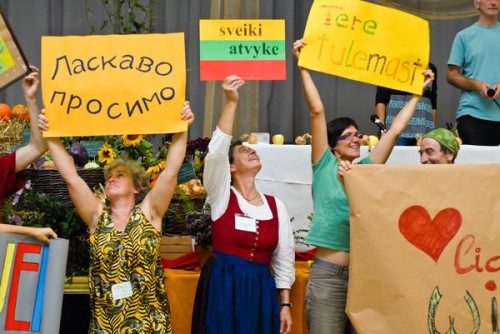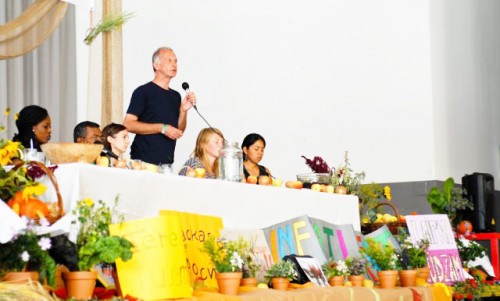Five years ago, a historic event took place in the West African country of Mali. Social movements from around thegoose couple vente world gathered together to develop a common EX300 exam framework and action plan for the global movement for food sovereignty, the right of people to define their own food and agriculture policies. Known as the Nyéléni 2007 Forum for Food Sovereignty, this gathering was a definitive moment for a burgeoning global movement and provided a springboard for many of the food sovereignty efforts currently underway in the different regions of the world, including the US. (Read WhyHunger’s reports from Nyéléni 2007 here and here).
 2011 Nyeleni participants
2011 Nyeleni participants
Today, movements across Europe are taking a 70-485 major leap forward in the commitments made in Nyéléni by holding the first-ever Europe-wide food sovereignty forum in Krems, Austria, aptly named Nyéléni 2011. I have the honor of being here at this forum in Krems as part of an international delegation examtrue from Mali, Nigeria, Mozambique, India, Peru, Guatemala, Canada, and the US. My main reason for being here is to glean as much from this process as possible in order to inform our own movement-building efforts back home in the US. Also, people here are genuinely interested in what we’re up to in the United States, such as the recent formation of the US Food Sovereignty Alliance, and want to learn from our experiences as well. So I did my best in the few short minutes allotted to me during this morning’s plenary to share what I could of the US 642-374 certification context—the fact that there are many pockets of resistance in the US, both in urban and rural communities and across all sectors of the food system, and how our challenge right now is to join together these efforts and grow them into the strong, unified movement that it will take to bring about the change that is necessary.
 Three small farms are better than one big one.
Three small farms are better than one big one.
I was touched to find that these words were received with the most heartwarming outpouring of solidarity and support. People here are acutely aware of the global impacts of US policies and institutions, and they appreciate the resistance of US-based movements and realize what we are up against. They are very much with us in our struggles.
To provide a quick glimpse of what it’s like here, there are 400 people from over 35 countries, and the atmosphere is colorful, lively, and energizing. Similar to the original Nyéléni, the organizers here have gone to great lengths to have this forum embody the spirit of food sovereignty in every way possible, from the fresh, local food 640-864 served at mealtimes, to the highly participatory and action-oriented design of the sessions. Also similar to the first Nyéléni, this gathering is truly a labor of love, with a cohort of one hundred volunteers doing everything from simultaneous translation to the maintenance of compost toilets.
 WhyHunger
WhyHunger
Of course, being here and thinking back to the first Nyéléni has led me to reflect on the trajectory of the food sovereignty movement in the US since. How has the movement has grown and evolved? What new challenges and opportunities might lie on the horizon? And in the midst of great urgency and crisis, how might we too pave a new way forward for a stronger and more unified movement? Hm…Nyéléni USA, anyone?
Read opening remarks from WhyHunger’s Director of the Global Movements program, Christina Schiavoni:
Thank you! My name is Christina and I am here from the United States as part of the US Food Sovereignty Alliance. And I send you warm greetings and heartfelt solidarity, not only from myself and my organization, but from the many diverse movements in the United States, who, just like all of you, are struggling for food sovereignty. This includes dairy farmers from the state of Wisconsin who are fighting price fixing and corruption at the Chicago Mercantile Exchange, which has ripple effects around the world. Although they couldn’t be here, they send you their solidarity in the struggle and they have also sent you materials that are on the tables outside.
On the one hand, coming to a food sovereignty forum as the only delegate from the US doesn’t exactly make me feel like the most popular person in the room. I know what the institutions and policies of the US represent to the global food sovereignty movement. The commodity speculation in Chicago and on Wall Street that is driving extreme food price volatility with deadly consequences. Our agrofuels and carbon trading policies. Our free trade agreements. And worst of all, many of the corporations that are driving the destruction of this planet—Monsanto, Cargill, ADM, etc.
and policies of the US represent to the global food sovereignty movement. The commodity speculation in Chicago and on Wall Street that is driving extreme food price volatility with deadly consequences. Our agrofuels and carbon trading policies. Our free trade agreements. And worst of all, many of the corporations that are driving the destruction of this planet—Monsanto, Cargill, ADM, etc.
But the fact is that these very same policies and institutions that are wreaking havoc around the world are wreaking havoc at home as well. They are doing so at a time in which hunger is at a record high in the US, and very basic protections are being cut. And some of the very worst paid and most exploited of all people in the US are the workers across the food system.
But the good news is that there are many pockets of resistance in the US, both in urban and rural communities and across all sectors of the food system. Our challenge right now is to join together these efforts and grow them into the strong, unified movement that it will take to bring about the change that is necessary. That’s why it is so important and such an honor for me to be here at this historic event—to draw inspiration and guidance to bring back home to inform our own movement-building efforts in the US. It’s also important for me to let my comrades back home know that all of you are paying attention and counting on us to do our part.
So we commit to you that we will grow and strengthen our movement and we will join together with all of you and with all of our other brothers and sisters across the world in the global struggle for food sovereignty.
Thank you.


